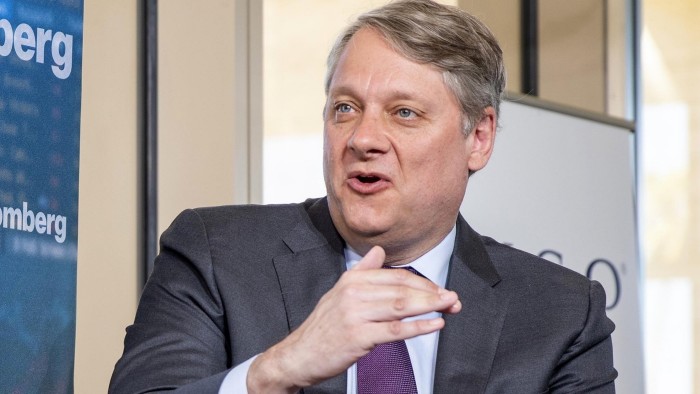Unlock the White House Watch newsletter for free
Your guide to what Trump’s second term means for Washington, business and the world
Investors are underestimating Donald Trump’s resolve to restore the steep tariffs that upended markets last month, bond giant Pimco has warned, as its investment chief said recession risks were now the highest in years.
“Believe Trump. He believes in tariffs,” Dan Ivascyn, chief investment officer at Pimco, said in an interview with the Financial Times alongside chief executive Emmanuel Roman.
Trump imposed “reciprocal” levies on many major trading partners at his “liberation day” event on April 2, a move that sent US equities and some corporate debt reeling. The president’s decision a week later to pause the levies on most trading partners for 90 days calmed markets, with the S&P 500 share index reversing the plunge triggered by the announcement.
However, on the sidelines of the Milken Institute Global Conference in Beverly Hills, Ivascyn said investors were mistaken to think Trump’s levies would be completely withdrawn or less forceful than previously announced.
“People still believe that there are going to be off-ramps [to tariffs], and that we are going to get back to something that feels a bit more like it did pre-’liberation day’,” he added. “We’re not so sure.”
Still, Ivascyn noted that “we do think that we’re going to see lower ultimate tariff rates”, saying the $2tn asset manager would look closely at how Trump calibrated his policies based on the reaction of markets and policymakers such as those at the Federal Reserve.
Ivascyn also said the levies could lead to “a more ‘stagflationary’ scenario [with] higher price levels at a time where you see [the economy] slowing”.
“We very well may have a recession,” he added. “The probabilities are the highest they’ve been in a few years.”
Ivascyn’s comments came as the Fed on Wednesday warned that Trump’s policies had increased uncertainty over the outlook for the world’s biggest economy and could increase inflation and unemployment.
Pimco has been cautious about allocating to economically sensitive areas of markets, with Ivascyn noting that in corporate debt there was “a lot of the froth or complacency”.
“We continue to be defensive there,” Ivascyn said.
Recommended
He added that Pimco still favoured “high-quality sectors like mortgages” given “the household balance sheet is very strong”. At the same time, he said Pimco had made small increases to its US government debt exposure over the previous two months, focusing on shorter-dated maturities.
Even so, Ivascyn said the volatility and uncertainty in US markets and the country’s deteriorating fiscal position had increased the appeal of investing in sovereign bonds in other markets.
“The US is not going to lose its reserve currency status soon,” Ivascyn said. “But . . . it’s hard to see meaningful progress on deficits.
“That, combined with the fact that this tariff policy . . . will likely lead to an increase in the price level here; we think it’s prudent and it makes sense to just look for other high-quality markets to diversify into.”



